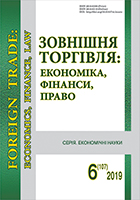Institutional capacity of national competition offices
DOI:
https://doi.org/10.31617/zt.knute.2019(107)06Keywords:
institutional capacity, national competition offices, competition policy, European integration, Anti-monopoly Committee of UkraineAbstract
Background. In the face of increasing globalization challenges and increasing the level of riskiness in all areas of economic life, the problems of competition policy implementation, improving the mechanism of control over the functioning of the competitive environment, competition protection and increasing the competitiveness of national market entities are urgent. The analysis of the international experience peculiarities of increasing the institutional capacity of national competition authorities is an important scientific task.
Analysis of recent researches and publications indicates that, despite the existence of some scientific developments, the research issue of the institutional capacity of national antitrust authorities requires further deep and systematic scientific research.
The aim of the article includes the disclosure of theoretical foundations and practical aspects generalization of the institutional capacity formation of national competition offices and determining the directions of its increase.
Materials and methods. A set of methods and approaches that enables the realization of system and conceptual unity of the research, namely dialectical, systemic and comparative analysis and synthesis is used by the author.
Results. The competition policy, which is conducted primarily by the national competition authority takes an important place in the system of economy state regulation. The complexity of functioning and development process of competitive relations necessitates the state competition policy formation as a separate direction of economic policy.
The results of the analysis identified the issues the resolution of which should increase the level of institutional capacity of national antitrust authorities. This is an improvement of cartel conspiracy detection and investigation procedures; exemption from liability of business entities who provided the information about cartels; bringing the order of control over concentrations and concerted actions to EU standards; procedure improvement of carrying out inspections of compliance with the requirements of Law on Protection of Competition by business entities.
Conclusion. Based on the conducted analysis of the theoretical foundations and the practical aspects of the institutional capacity of the national antitrust authorities, it can be argued that the competition enforcement and advocacy procedures have a decisive influence on these processes. Therefore, the institutional capacity improvement of national antitrust authorities is linked to: openness to the business sector; the implementation of competition standards proven by world practice; raising the cost thresholds in concentration control matters; amendments to the current legislation on penalties, etc. However, many tasks still need to be solved. First of all, this is an improvement of the existing competition institutions and the introduction of new ones.
References
Gejec', V. M., & Grycenko, A. A. (2019). «Novyj pragmatyzm» jak instrument inkljuzyvnoi' globalizacii' (do 70-richchja profesora Gzh. V. Kolodka) [«New pragmatism» as an inclusive globalization tool (to the 70th anniversary of the professor Hzh. V. Kolodka)]. Ekonomika Ukrai'ny – Ukraine economy, 1, 3-15 [in Ukrainian].
Cherlenjak, I. I., & Mashiko, K. S. (2017). Instytucijna ta ekonomichna dynamika nacional'nogo biznesu [Institutional and economic dynamics of national business]. Naukovyj visnyk Uzhgorods'kogo universytetu – Uzhgorod University Scientific Bulletin. (Iss. 2), (pp. 107-116). Serija Economika [in Ukrainian].
Lagutin, V. D. (2018). Mozhlyvosti instytucijnogo analizu suspil'noi' stabil'nosti ta rozvytku [Possibilities of institutional analysis of social stability and development]. Visnyk Kyi'vs'kogo nacional'nogo torgovel'no-ekonomichnogo universytetu – Herald of Kyiv National University of Trade and Economics, 3, 37-52 [in Ukrainian].
Magas, V. M. (2019). Pidpryjemnyctvo ta konkurencija – osnovni chynnyky rozkryttja ekonomichnogo potencialu suspil'stva [Business and competition – the main factors of economic potential public disclosure]. Ekonomichna teorija – Economic theory, 2, 44-56. DOI: https://doi.org/10.15407/etet2019.02.044 [in Ukrainian].
Mazaraki, A. A. (2016). Instytutotvorcha funkcija suchasnoi' merezhevoi' rozdribnoi' torgivli [Institutional function of the modern retail network]. Visnyk Kyi'vs'kogo nacional'nogo torgovel'no-ekonomichnogo universytetu – Herald of Kyiv National University of Trade and Economics, 4, 5-21 [in Ukrainian].
Umantsiv, I., Sonko, Y., & Yatsyshyna, K. (2019). Competition at product markets of various types of commodities. Problems and Perspectives in Management. (Vol. 17). (Iss. 2), (pp. 334-347). DOI: https://doi.org/10.21511/ppm.17(2).2019.26 [in English].
Gerasymenko, A. G. (2014). Rynkova vlada: dzherela, masshtaby, naslidky [Market power: sources, scopes, consequences]. Kyi'v: Kyi'vs'kyj nacional'nyj torgovel'no-ekonomichnyj universytet. Kyiv: Kyiv National University of Trade and Economics [in Ukrainian].
Karp’juk, O. P. (2016). Programa «Linensi» u konkurentnij polityci krai'n svitu [«Linensi» program in the competition policy of the world countries]. Zovnishnja torgivlja: ekonomika, finansy, pravo – Foreign trade: economics, finance, law, 2, 77-89 [in Ukrainian].
Lagutin, V. D. (2019). Cyvilizacijni ta instytucijni faktory global'nyh ekonomichnyh transformacij ХХI st. [Civilizational and Institutional Factors of Global Economic Transformations of the 21 century]. Zovnishnja torgivlja: ekonomika, finansy, pravo – Foreign trade: economics, finance, law, 2, 5-19. DOI: 10.31617/zt.knute.2019(103)01 [in Ukrainian].
Lagutin, V. D. (2016). Konkurentna polityka derzhavy: mehanizm realizacii' [State competition policy: implementation mechanism]. Visnyk Kyi'vs'kogo nacional'nogo torgovel'no-ekonomichnogo universytetu – Herald of Kyiv National University of Trade and Economics, 4, 22-37 [in Ukrainian].
Ugoda pro Asociaciju mizh Ukrai'noju, z odnijei' storony, ta Jevropejs'kym Sojuzom, Jevropejs'kym spivtovarystvom z atomnoi' energii' i i'hnimy derzhavamy-chlenamy, z inshoi' storony. [Association Agreement between Ukraine, of the one hand, and the European Union, the European Atomic Energy Community and their Member States, of the other hand]. Retrieve from https://zakon3.rada.gov.ua/laws/show/984_011 [in Ukrainian].
Pryncypy ta mehanizmy vykorystannja instrumentu Twinning v Ukrai'ni. [Principles and mechanisms of the use of the Twinning tool in Ukraine]. Retrieve from http://www.center.gov.ua/pres-tsentr/novini/item/18-twinning [in Ukrainian].
Fefelov, O. (2018). Nove oblychchja AMKU u svitli jevrointegracii' [The new face of the Anti-monopoly Committee of Ukraine in the light of European integration]. Jurydychna gazeta – Legal newspaper, 18. Retrieve from http://yur-gazeta.com/publications/practice/inshe/nove-oblichchya-amku-u-svitli-evrointegraciyi.html [in Ukrainian].
Rishennja AMKU pro prymusovyj podil grupy OSTCHEM. [The decision of Anti-monopoly Committee of Ukraine to force the division of the group OSTCHEM]. Retrieve from http://www.amc.gov.ua/amku/control/main/uk/publish/article/151589 [in Ukrainian].
Dijal'nist' u sferi publichnyh zakupivel'. Retrieve from http://www.amc.gov.ua/amku/control/main/uk/publish/category/134941 [in Ukrainian].
Additional Files
Published
How to Cite
Issue
Section
License
Copyright (c) 2022 Foreign trade: Economics, Finance, Law

This work is licensed under a Creative Commons Attribution 4.0 International License.
This work is licensed under a Creative Commons Attribution 4.0 International (CC BY 4.0)







